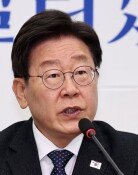‘Korea discount’
‘Korea discount’
Posted February. 23, 2019 07:52,
Updated February. 23, 2019 07:52
A banker working in New York met with an executive of Singapore state investment firm Temasek in 2017 when the threat of North Korea’s nuclear weapons and missiles escalated. The banker said the Temasek executive told him knowledge about the North’s nuclear development and its impact on the Korean Peninsula, which was so broad and wide that he could hardly believe the latter to be a financial executive. The banker said the executive was a high-ranking official of the Singapore Defence Ministry, who was in charge of analyzing geopolitical risks related with investment.
When this reporter asked if Korean pension funds or wealth funds hire such high caliber professionals, the banker instantly denied. “Look at the service term of CEOs at Korean financial institutions,” the banker said. “Since it is difficult for a CEO to stay put and continue service for more than one year, it would be impossible to create an environment where experts in specific areas can survive for a long time.”
Korean pension and wealth funds have grown, now so big in sizes that Wall Street cannot afford to downplay them. However, the culture of short duration of CEOs’ terms remains unchanged. Among former presidents of Korea Investment Corporation, a sovereign wealth fund, Jin Young-wook is the only one who completed his term in office before stepping down, while others had to resign prematurely. At the National Pension Service, the chairman who serves on the post for the three-year term is considered a long-serving CEO. Bankers and investors on Wall Street believe that the CEO of Korean pension and wealth funds will naturally be replaced following switch of administrations.
On Wall Street, there is a flurry of veteran CEOs, whose are dubbed "vocational career CEOs." J.P. Morgan Chase CEO Jamie Dimon has been serving for 14 years. Former Goldman Sachs CEO Lloyd Blankfein served for 12 years until his retirement late last year. These experts are quite well aware of who leading experts are on Wall Street and where they are investing. We wonder whether these veteran experts who are capable of instantly solving over the phone through their personal networks those problems, which working-level staff are unable to solve, remember the names of Korean financial institution CEOs, whose terms are short.
The situation would be somewhat better if a working-level team includes a veteran professional. However, watchers say that Korean pension and wealth funds operate overseas offices and manpower are inferior in working condition and staff sizes not only to foreign pension and wealth funds but also to domestic private financial institutions. As their counterparts in Korea are vacant or replaced so often, U.S. financial institutions are sometimes even asking Korean financial firms whether those companies are operating properly at all. The head of National Pension Service’s New York office, which is in charge of 40 percent of its 194 trillion-won (172 billion dollars) overseas investment, has remained vacant since July last year. The New York office of Korea Post, which owns wealth worth 124 trillion won (110 billion dollars) in total, only conducts research surveys and serves as liaison office. The chief gets replaced almost every year.
It is difficult for professionals to settle down in organizational culture wherein hierarchical ranks and positions rather than professional knowledge and robust experience are valued and highly emphasized. Korea's practices to remove deep-rooted evils and bad practices and to replace employees whenever CEOs and administrations are taking power are another reason for "dearth of veteran professionals." When targeting people based on different ideology and philosophy, professionals will go into hiding. Pension and wealth funds that are struggling due to mass departures of core personnel are ill afford to fulfill their responsibility as the trustee of people’s wealth.
"Korea discount" refers to Korean companies and financial institutions’ failing to win recognition, which they deserve in the global market, but it does not stem just from geopolitical problems such as North Korea’s nuclear threats. Demanding pension and wealth funds to generate profit without experts even at Wall Street is no different from asking elementary kids to solve differential and integral calculus problems. Before fretting about lack of Samsung Electronics in the Korean financial sector, we have to ask the reason why Korea does not have financial Steve Jobs or Korean Lloyd Blankfein.”
Yong Park parky@donga.com







